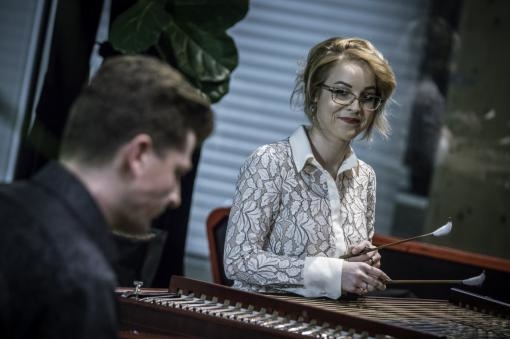The cimbalom is an instrument most of us associate with folk music. This may be especially because of the long tradition of cimbalom music, which in the course of the 20th century gradually began to be promoted in Moravia.
However on Monday in the newly opened café Podobrazy we could convince ourselves that we should not dismiss the cimbalom as an instrument for classical music. The opportunity that allowed this was a concert by the duo Cimbalom Dualité, made up of husband and wife Nikol and Petr Spěvák.
This duo’s history began at the conservatory in Kroměříž, where both musicians studied. Their teacher was the Czech cimbalom-player, teacher and long-time director of the prestigious Valašské Meziříčí International Cimbalom Festival, Růžena Děcká, who last year was awarded the PRO AMICIS MUSAEl for her lifetime contribution in the area of culture.
The fate of this pair of cimbalom players was linked in their personal lives and they decided to also link up professionally. They began to study at the Liszt Academy in Budapest with Ilona Szeverényi. Already at that time part of their repertoire was made up of duets. Their virtuoso interpretations several times won them first place at the already-mentioned international cimbalom festival. After successfully completing their studies they did not lose their enthusiasm for playing duets. Today as husband and wife they are among the few professional musicians dedicated to playing together on this instrument at a world-class level. It is thanks to this that more and more often there are composers writing specifically for them. In the past among their number was the Ostrava composer, cimbalom player and teacher Daniel Skála.
And Monday’s concert kept to the pattern of twos. First there were two songs for two cimbaloms - Píseň o padajícím listí (Song of Falling Leaves) and Píseň o jarní vichřici (Song of a Spring Storm). Their author is Jarmila Mazourová. Typical for this composer is programme music with a very clear atmosphere and she is a favourite with youngsters. Amidst the flood of demanding and indigestible contemporary pieces this is I think one of the ways of adapting today’s artificial music for a wider public. The first of the songs communicated the grim and even depressing mood of autumn. This then was literally scattered in a rush of energy, with which the author transferred musically to the next song.
The second premiere and at the same time closing work of the whole concert has the title Dualité. Its author is the singer and composer Jiří Miroslav Procházka, who was the initiator of the reviewed event. Apparently also for this reason the whole evening carried the spirit of this principle. Both interpreters did an excellent job with this demanding piece, which could be expected of them.
In the first part of the programme in the full to overflowing café, people could listen to a musical transformation from the Baroque to the music of the 20th century in interpretations of works by J.S. Bach, D. Scarlatti and B. Bartók, which was an interesting opportunity to compare folk and classical pieces. The Spěváks reminded the audience of this dimension of cimbalom playing with a famous Romanian song called Gempara. After the end of these natural melodies it was clear that among the cimbalom players and the audience there were many folk enthusiasts, and they deserved the storm of applause.
It should not be left out that the whole evening was presented tastefully and with a pleasant dose of humour by the Catholic priest, documentary maker and presenter Jan Hanák. He recalled the significant years (in Czech history) ending with the symbolic number eight as well as dualities across history. The occasional diversions from the theme could be forgiven thanks to his excellent presenting. The exceptional nature of the whole evening was underlined by the presence of both of the composers being premiered as well as Professor Děcká.
Holding the concert in the cafe created a pleasant and almost domestic atmosphere. However the music would have excelled even in a bigger concert hall. The whole programme reminded us that musicality, which in Moravia is often ignited by folk music in childhood, can mature in adulthood and educate artists able to succeed among global competition.
































No comment added yet..